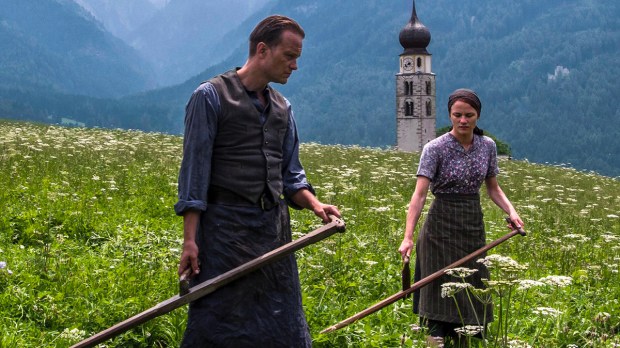Variety recently reported that Terrence Malick’s upcoming film Radegund was licensed to UGC for France at the European Film Market, releasing a first-look photo from the film and hinting at a 2017 release.
UGC’s Thierry Decourcelle is quoted as saying Malick’s screenplay is “one of the strongest scripts we have read in recent years.” Both fans and detractors of Malick might say the strength of his scripts don’t much matter either way; the man is notorious for eviscerating his screenplays on set and in post-production, especially in his ongoing and prolific turn toward more meditative, abstract, and spiritual films. (In fact, it’s worth asking whether the critical backlash against Malick is more about this explicit religious sensibility than his scripts or camerawork.)
Then again, this script bears the weight of a true story behind it. Radegund will be based on the life of Franz Jägerstätter, an Austrian farmer who was executed by the Nazi regime in 1943. “Opening at Jägerstätter’s home in the idyllic Austrian countryside,” one synopsis reads, “the film follows Franz and his wife, Fani, along their path of resistance. Told through real wartime letters, this love story finds the couple in conflict with the members of their close-knit town, their church, their government, and even their friends – all of which brings them to a dramatic choice.”
You can dive deeper into Jägerstätter’s story with the excellent German film “The Refusal” (
) or (for something quicker) the Vatican’s brief biography on this “layman and martyr”:“Franz Jägerstätter was born on 20 May 1907 in St Radegund, Upper Austria… Besides his farm work Franz became the local sexton in 1936 and began receiving the Eucharist daily. He was known to refuse the customary offering for his services at funerals, preferring the spiritual and corporal works of mercy over any remuneration. In the mid to late 1930s, while much of Austria was beginning to follow the tide of Nazism, Franz became ever more rooted in his Catholic faith and placed his complete trust in God. While carrying out his duties as husband and bread-winner for his wife and three daughters, this ordinary man began thinking deeply about obedience to legitimate authority and obedience to God, about mortal life and eternal life and about Jesus’ suffering and Passion. Franz was neither a revolutionary nor part of any resistance movement, but in 1938 he was the only local citizen to vote against the ‘Anschluss’ (annexation of Austria by Germany), because his conscience prevailed over the path of least resistance. Franz Jägerstätter was called up for military service and sworn in on 17 June 1940. Shortly thereafter, thanks to the intervention of his mayor, he was allowed to return to the farm. Later, he was in active service from October 1940 to April 1941, until the mayor’s further intervention permitted his return home. He became convinced that participation in the war was a serious sin and decided that any future call-up had to be met with his refusal to fight…. In February 1943 Franz was called up again for military service. He presented himself at the induction center on 1 March 1943 and announced his refusal to fight, offering to carry out non-violent services: this was denied him. He was held in custody at Linz in March and April, transferred to Berlin-Tegel in May and subject to trial on 6 July 1943 when he was condemned to death for sedition… On 9 August, before being executed, Franz wrote: ‘If I must write… with my hands in chains, I find that much better than if my will were in chains. Neither prison nor chains nor sentence of death can rob a man of the Faith and his free will. God gives so much strength that it is possible to bear any suffering…. People worry about the obligations of conscience as they concern my wife and children. But I cannot believe that, just because one has a wife and children, a man is free to offend God.’ Franz Jägerstätter, who would not bow his head to Hitler, bowed his head to God, and the guillotine took care of the rest.”
Jägerstätter was beatified in the Catholic Church in 2007 with his 94-year old widow in attendance (“I always prayed to the Lord God that he would let me live to experience this day,” she said). In a letter written for the ceremony, then Pope Benedict XVI praised Jägerstätter as a man who “gave up his life in magnanimous self-denial.”
The man behind The Thin Red Line and The Tree of Life is easily one of the greatest living American directors. And if the first photo is any indication, this new story about love, faith, and fortitude – however he tells it – will be as steeped in beauty as it is in truth.

